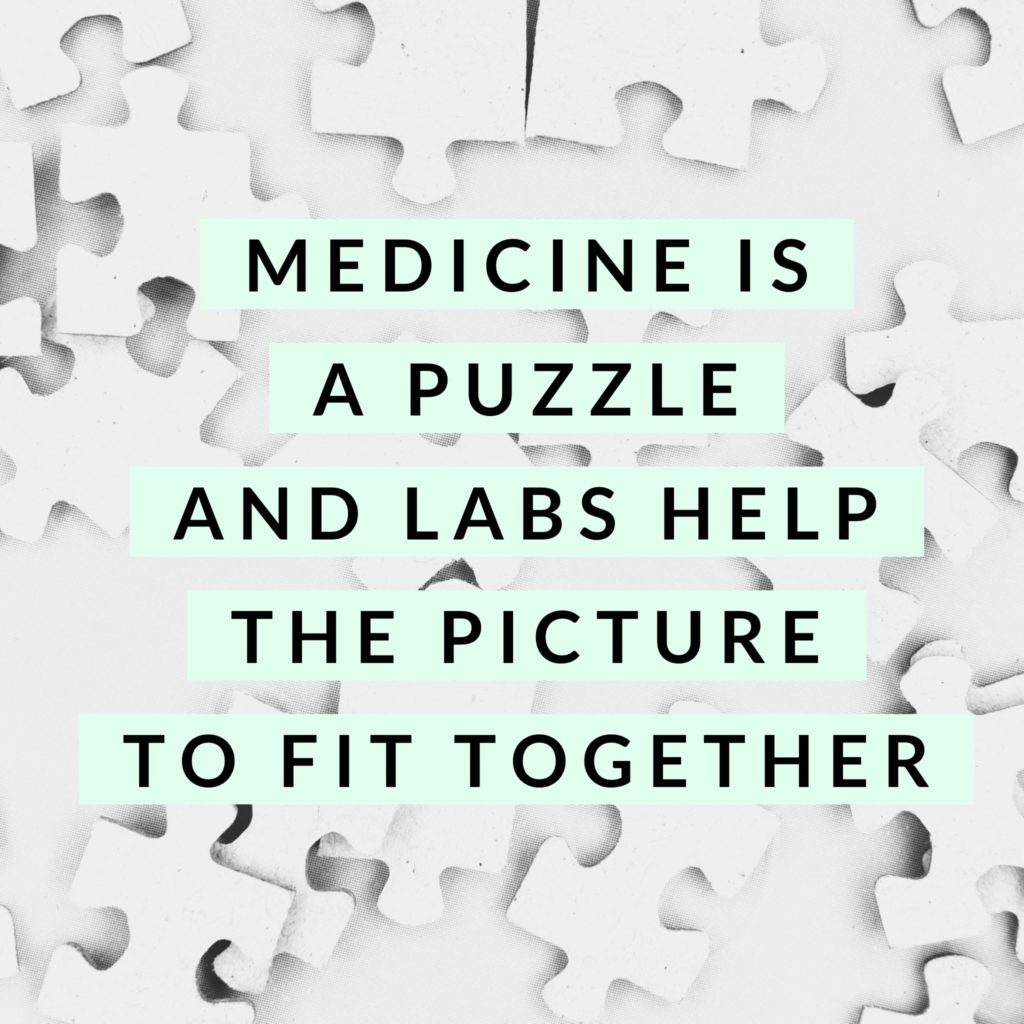Anyone take up puzzle building, (puzzling?) over quarantine? It takes a lot to make the pieces fit together and sometimes it requires looking at the same piece 10 times in a different way to figure out how it fits.
This is very similar to medicine. In medicine we have a ton of pieces- the patient’s story, the labs, the physical exam, the patient’s lifestyle, exposure, mental/emotional health, etc. And very rarely is it immediately clear how everything fits together. It takes a lot of pieces and a lot of thinking about how they fit together to really get to the root cause of the problem. While labs are not the whole puzzle, they are often a necessary piece to help form the picture.
In my last post I talked about why annual screening labs are important. But the question still stands of which labs should be a part of the “screening”? Below, I list what labs I like to see for a new patient. (Not all of these may need done every year and others may need done more than once a year depending on what is found, but when I am establishing care, this is my usual baseline).

CBC– This looks at your red and white blood cells checking for things like infection and anemia.
CMP– This lab is best done fasting because it checks glucose levels as well as electrolytes, liver and kidney function.
Lipid Panel – This lab looks at your cholesterol levels (total, LDL and HDL) as well as triglycerides.
HbA1c and/or Fasting Insulin– An HbA1c evaluates how regulated your glucose levels have been over the last 3 months. Fasting insulin can indicate insulin resistance. Both tests indicate uncontrolled blood sugar, which is very hard on your body and can predispose you to other conditions, most commonly, metabolic syndrome
TSH/FT3/FT4 – This looks at thyroid function. TSH tells your thyroid to make more thyroid hormone and Free T3 and Free T4 are the actual thyroid hormones circulating in your body. Thyroid hormones are in charge of SO MANY functions of the body including metabolism and protein synthesis, which effects the heart rate, body temperature, digestive tract, muscle contraction, etc. Therefore, its important to check to see if your thyroid is in tip top shape.
AM Cortisol– Cortisol is the hormone that gives you energy and is commonly out of balance due to our stressful culture. While there are many tests to thoroughly evaluate cortisol, this is a baseline one I like to run in most patients.
Vitamin D – Vitamin D is involved in 300 metabolic processes in the body including immune system regulation and bone health. Even in sunny places, it is a very common vitamin deficiency, which is why it is so important to check.
Urinalysis – This confirms that there is no infection present in the urinary tract as well as proper kidney functioning.
Iron and Ferritin – Iron levels are important because they are a main part of hemoglobin- the protein in red blood cells that carries oxygen through your body. Ferritin measures how much iron you have stored in your body. Low ferritin often correlates with iron deficiency and high ferritin can indicate problems such as chronic disease or hemochromatosis.
Male/Female Hormones – Imbalance of hormones can be a common problem that can be addressed in a variety of ways. Have a proper hormone balance can expedite the healing process for a variety of conditions and may be the source of the problem for many others. Therefore, in men, I like to check total and free testosterone as well as steroid hormone binding globulin (SHBG), DHEA and PSA (free and total). In women, I like to evaluate DHEA, SHBG, progesterone, testosterone (free and total), FSH, LH and estradiol.
ESR, CRP – These are inflammatory markers that evaluate the total level of inflammation in the body.
doi:10.1097
doi: 10.1172
doi:10.1371